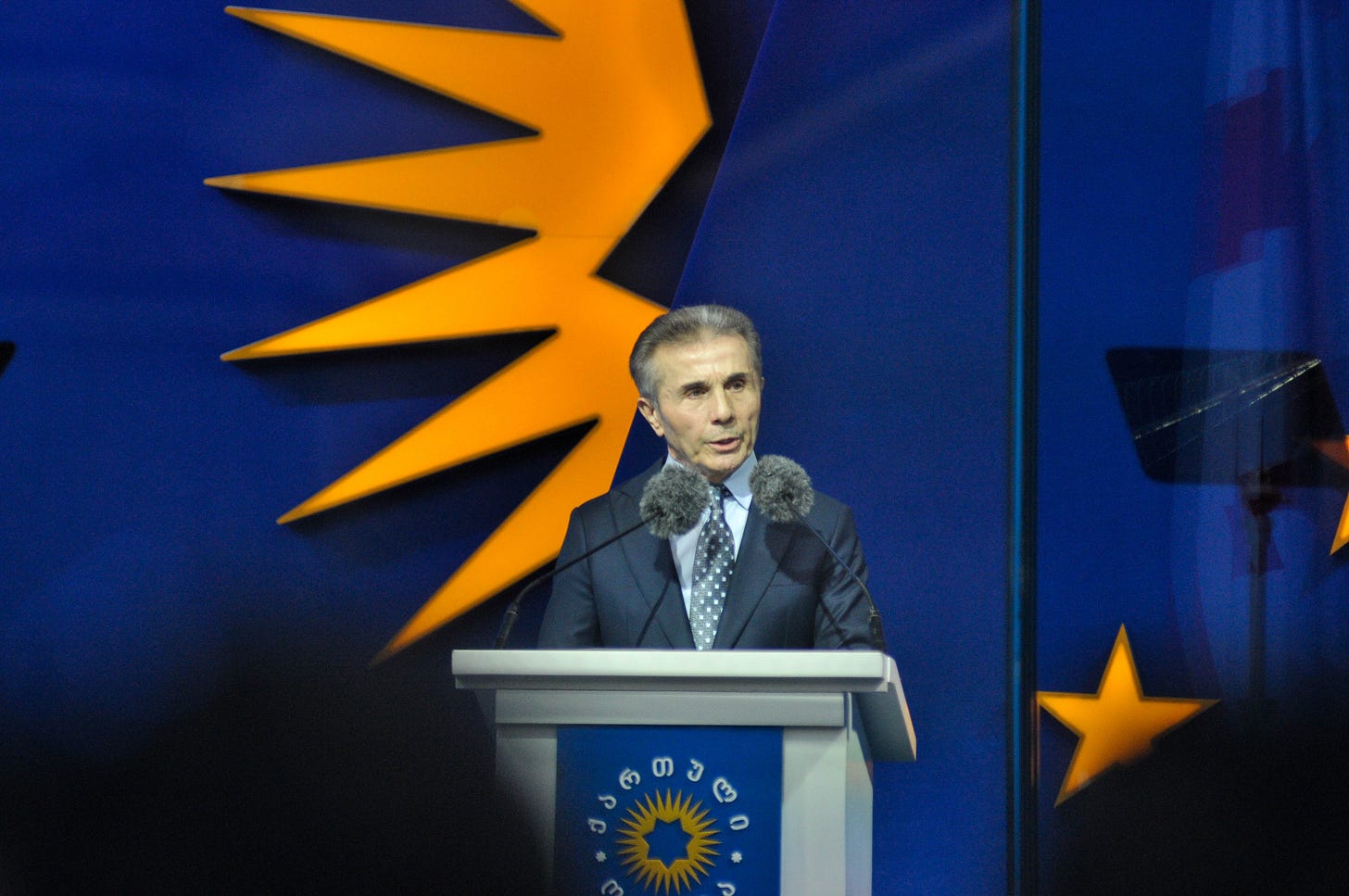Georgia’s Last Chance for Freedom
The ruling party wants to cement its hold on power forever.

AROUND TBILISI, POSTERS for the ruling Georgian Dream Party display a graphic blend of the party’s sun-shaped logo and the EU flag. They’re ubiquitous. The message, unlike the party sponsoring it, is pro-Western, but heavy with qualifications. “Towards Europe”—but “only with peace, prosperity, and pride.”
The campaign is trying to fudge it, but in reality Georgians have a binary choice to make on October 26. They can continue to be governed by Georgian Dream, or they can work toward membership in the EU and NATO—but not both. This is how the personalistic party built by Russian-connected billionaire Bidzina Ivanishvili wants to cement its hold on power and end Georgia’s dreams of democracy—by promising democracy.
Georgian Dream has undergone a major transformation. What was once a populist-technocratic, pro-EU faction has become an explicitly reactionary force regurgitating Russian propaganda and imitating some of the worst elements of Europe’s far right, including an openly autocratic governing style. Comparisons are always imperfect. Yet, Georgian Dream’s trajectory is reminiscent of similar metamorphoses by Fidesz in Hungary, Smer in Slovakia, or ANO in the Czech Republic, where parties with initially liberal, social-democratic, and managerial-technocratic agendas morph into illiberal, Russian-friendly, and authoritarian forces as soon as their leaders saw that thereby might lie the path to permanent power.
The government accused the opposition of being connected to a “Global War Party” seeking to drag Georgia into a conflict with Russia. It has also reneged on many of its earlier, pro-Western commitments. And although the EU granted Georgia candidate status alongside Ukraine and Moldova last year, its accession process was brought to a halt this summer following the adoption, against mass protests and a presidential veto, of a “foreign agents law” modeled on Russia’s that imposes draconian restrictions on NGOs receiving funding from abroad. The law is widely seen as providing the government an excuse to persecute the opposition, as has been the effect after Russia and Hungary passed similar legislation.
Last week, Prime Minister Irakli Kobakhidze announced that in order to compensate for the losses of foreign funding, the government would set up a fund to help civil society organizations working in the “Georgian people’s interests.”
The irony of government-funded NGOs may be lost on Kobakhidze, but the idea is not an isolated one. This summer, he suggested banning a swathe of opposition parties, including the main one, the United National Movement formerly led by Mikheil Saakashvili, and canceling of parliamentary mandates for their candidates. Promising to kill democracy in order to save it, he added that such “democratic bans” would remove “obstacles to the country's European integration.”
Georgia has provided a safe haven for more than 100,000 Russians seeking to avoid conscription since the full-scale invasion of Ukraine. It has also received billions in remittances and other financial flows from Russia. Under a new tax law, Georgia has made it easier and cheaper to move off-shore capital to the country, the better to capitalize on the country’s position as a hub of sanctions evasion and money laundering.
Georgia has also opened itself to Chinese investment, mostly in infrastructure. The prospective deep sea port of Anaklia, which was going to be developed by a American-led consortium, was awarded under opaque conditions to a Chinese entity. Improving Georgian infrastructure could provide key connections between the oil and gas fields of the Caspian Sea and Europe without transiting either Russia or Iran. Chinese control of those connections would be, to say the least, suboptimal for American and European interests.
Eighty percent of Georgians want to see their country in the EU—hence Georgian Dream’s dishonest campaign messaging. Tbilisi itself, with its cutting-edge architecture, quirky cafés, and stylish youth, looks more like a Western European city than a stereotypical “post-Soviet” city. Polling, which now places Georgian Dream below where it needs to be to preserve its grip on power, is a source of hope for the previously fractured opposition, which is slowly coalescing into a small number of unified blocs.
Some Georgians harbor no illusions about the depth of Ivanishvili’s Russian ties and the Kremlin’s willingness to tilt the balance in his favor. Yet, Georgian Dream’s appeal lies in the false promise of having one’s cake and eating it too—staying on Russia’s and China’s good sides while making progress with Georgia’s European integration.
The West must do more to dispel this myth. A high-ranking European official—ideally Josep Borrell, the EU’s top diplomat—should show up in Tbilisi. It wouldn’t hurt if he were joined by a senior representative from the United States. They ought to explain that, contrary to Georgian Dream’s election posters, the substance of the party’s policies and its political style are simply incompatible with Georgia’s European future.
The U.S. decision in July to impose visa restrictions on Georgian Dream officials and pause assistance to the government is a good one, but a higher profile showing in the country, after Sen. Jeanne Shaheen’s and Rep. Mike Turner’s visit earlier this summer, would help drive home the starkness of Georgia’s choice.
More importantly, however, the United States and its allies must have a conversation about Georgia’s security. To justify its obsequiousness toward the Kremlin, Georgian Dream taps into justified fears of the behemoth to the north, which invaded Georgia in 2008, continues to occupy one-fifth of its territory, and every so often grabs another chunk. The West must offer an alternative: a believable path toward Georgia’s NATO membership. If we fail at the task, we will have only ourselves to blame for Georgia’s eventual descent into Russian-style authoritarianism—a tragedy for us as well as for the brave people of Georgia.



